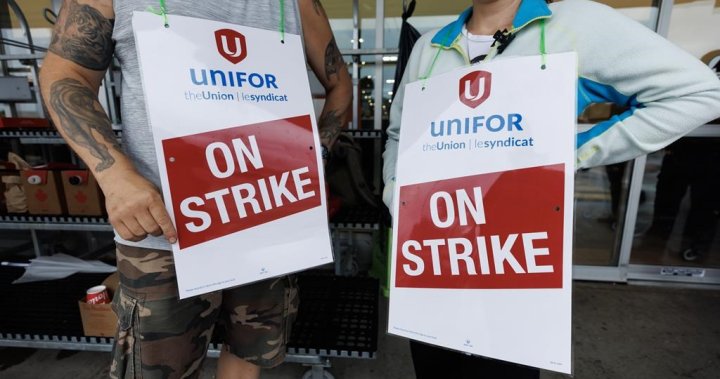Experience Samantha Henry’s groundbreaking strike that captivated the nation.
“Many believed the strike would only last a week or a couple of days. Yet, it persisted for nearly five weeks,” said Henry, one of over 3,700 Metro workers in the Toronto area who participated in the summer strike.
In previous negotiation attempts that did not result in strikes, Henry recalls that public sentiment regarding workers’ demands was often unfavorable.
“It was always like… ‘What do you expect? She’s just a retail worker,'” she explained.
This summer, however, was different. People, even loyal Metro customers, stood alongside the workers on picket lines. They pledged to boycott Metro-owned stores, honked their car horns in solidarity, and brought gift cards, coffee, and snacks.
“I think I consumed more donuts and Timbits than I ever have in my life,” Henry joked.
Henry believes that the pandemic has made people realize the essential role that retail workers play. She noticed that regular customers were outraged when grocery stores discontinued workers’ “hero pay.” However, the situation is more complex. Inflation and rising interest rates have impacted everyone’s finances, causing customers to empathize with lower-paid workers, regardless of their union affiliation.
“I believe that the sympathy towards striking workers stems from a broader affordability crisis that affects all workers,” explained Larry Savage, a professor in the labor studies department at Brock University.
According to analytics firm Gallup, approval of unions in the United States is currently at its highest level in over 50 years.
While tracking union support in Canada is not as regular, individuals involved in strikes and labor studies concur that public sympathy towards strikes in Canada is higher than usual as well.
A recent survey by the Angus Reid Institute indicated relatively high union support in Canada, but without historical data for comparison, it is difficult to gauge its significance, stated Adam King, an assistant professor in the labor studies department at the University of Manitoba.
Nevertheless, he highlighted that the Metro strike showcased that union messaging resonates with many Canadians. The grocery sector’s profits and the ongoing food price inflation have attracted significant public attention and sparked a personal connection.
In Canada, labor experts typically rely on individual polls during labor disputes to gauge public sentiment, which can vary, according to Savage.
Historically, unions have faced negative public perception due to the disruptions caused by strikes. The 2009 strike by City of Toronto workers, which severely impacted garbage collection, is a notable example.
Public support for a strike depends on the nature of the issue at hand. It is easier for the average citizen to support a strike that doesn’t directly affect them, compared to one that they can’t ignore, such as canceled flights or foul odors in the summer air.
However, recent polls on specific disputes have surprised Savage, revealing higher levels of support. For instance, an Abacus poll during the Ontario government and education workers’ dispute last year showed that more Ontarians blamed the government rather than the workers. Almost half of the respondents expressed support for other unions going on strike in solidarity.
Months later, during a strike by 155,000 federal government workers represented by the Public Service Alliance of Canada, an Angus Reid Institute poll showed robust support for almost every union demand.
“You don’t typically see that level of sympathy for public-sector workers,” Savage noted.
Bea Bruske, president of the Canadian Labour Congress, also observed a shift in public support during picket lines and rallies across the nation.
“The level of public support and understanding for the need to strike… is higher than it has been in many, many years,” Bruske remarked.
In the private sector, the general public is less sympathetic towards large, profitable corporations. This sentiment has been amplified in recent years and was successfully leveraged by Unifor against Metro, according to Savage.
Support from both the national union and the broader community can greatly assist a bargaining committee in reaching a favorable agreement, stated Mario Moceri, a national service staff representative with Unifor who supported approximately 250 workers during a seven-month dispute at the Windsor Salt Mine, which concluded with a ratified deal in late August.
Furthermore, community support sends a strong message to employers during negotiations. Moceri explained, “I think they knew we were fully committed for the long haul.”
While public support is crucial in some bargaining situations, King mentioned that its significance varies in different disputes.
“What is truly encouraging is that public support remains strong, even in cases where it may seem less impactful,” he added.
Savage emphasized the importance of public support in maintaining morale on picket lines. Being subjected to negative treatment and derogatory remarks can be demoralizing for striking workers.
Public support plays a significant role in public-sector bargaining since taxpayer money is involved. Disputes often revolve around issues like classroom sizes and transportation services.
“This type of public support is crucial in public-sector labor relations because governments face political consequences for precipitating a strike and disrupting essential services,” Savage explained.
However, Savage cautioned that the increased support for striking workers cannot be taken for granted, as this window of opportunity may be temporary.
Denial of responsibility! Vigour Times is an automatic aggregator of Global media. In each content, the hyperlink to the primary source is specified. All trademarks belong to their rightful owners, and all materials to their authors. For any complaint, please reach us at – [email protected]. We will take necessary action within 24 hours.





